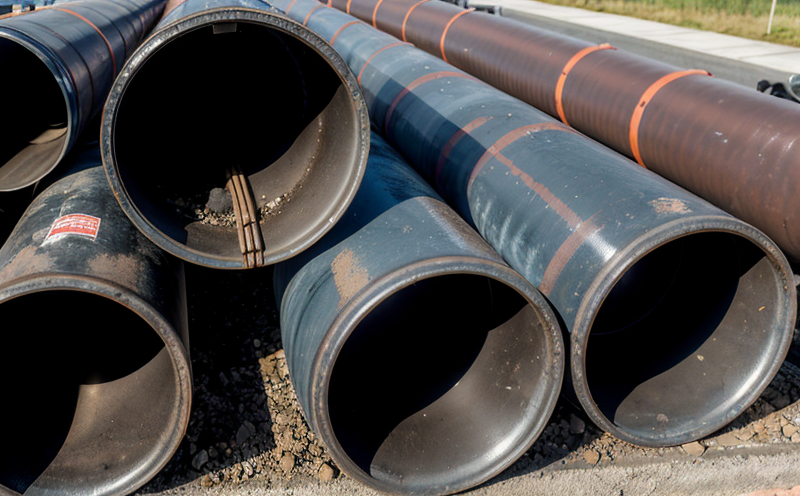BS EN ISO 2505 Longitudinal Reversion Testing of Plastic Pipes
The BS EN ISO 2505 standard is a critical method used to evaluate the long-term resistance of plastic pipes against heat and stress. This test is particularly relevant for assessing the durability and integrity of polymeric materials under conditions that may lead to reversion, which is essentially an undesirable permanent deformation or loss in mechanical properties over time.
Reversion can significantly impact the performance and lifespan of plastic pipes used in various applications such as water supply, drainage, and industrial processes. By conducting this test, manufacturers and quality assurance teams ensure that their products meet stringent requirements for long-term reliability and safety.
The testing procedure involves subjecting a sample of the pipe material to specified temperature and time conditions. The specimen is then visually inspected for any changes in color or appearance indicative of reversion. The degree of reversion, if present, can be quantified by comparing the post-test condition against the initial state using precise measurement techniques.
Understanding the mechanisms behind reversion helps in optimizing formulation processes and selecting appropriate additives that enhance thermal stability. This knowledge is crucial for the polymer & plastics industry as it directly influences product design and material selection. The test results provide valuable data to support decisions on which materials are best suited for specific applications, thereby ensuring compliance with international standards.
Compliance officers working in this sector will find BS EN ISO 2505 essential for maintaining regulatory adherence. R&D engineers can use the outcomes of these tests to innovate and improve product performance. Procurement teams also benefit from this test as it allows them to make informed choices about suppliers based on consistent quality assurance practices.
The importance of this testing cannot be overstated, especially in industries where the failure of a single pipe could lead to significant operational disruptions or even safety hazards. By incorporating BS EN ISO 2505 into their quality control processes, organizations can demonstrate their commitment to excellence and reliability.
Industry Applications
The BS EN ISO 2505 test is widely used across multiple industries where plastic pipes are employed. Water supply systems, particularly those involving potable water distribution networks, heavily rely on this testing method to ensure the longevity and safety of their infrastructure.
In the drainage sector, compliance with this standard ensures that waste management systems function efficiently over extended periods without degradation due to thermal stress. For industrial applications like chemical processing plants or oil refineries, selecting materials resistant to reversion is paramount for preventing leaks and maintaining process integrity.
Additionally, in construction projects requiring underground piping solutions, the durability of plastic pipes must withstand environmental elements as well as internal pressures. This test helps architects and engineers specify appropriate materials that meet both performance expectations and regulatory requirements.
The aerospace industry also benefits from this testing due to its need for lightweight yet robust materials capable of withstanding extreme temperature variations during flight operations. By adhering to BS EN ISO 2505, suppliers can guarantee consistent quality across all batches produced, enhancing trust among end-users.
Why Choose This Test
Selecting the right test methodology is key when it comes to ensuring product reliability and safety. The BS EN ISO 2505 Longitudinal Reversion Testing stands out because it specifically targets one of the most critical aspects affecting plastic pipes—heat aging resistance.
One major advantage of this test lies in its ability to detect subtle changes in material properties that might not be apparent through other forms of testing. For instance, visual inspection alone may miss early signs of reversion, but using BS EN ISO 2505 allows for quantification and documentation of these changes.
Another benefit is the standardization it provides. By adhering to internationally recognized protocols like this one, manufacturers can ensure consistency in their testing procedures across different locations and facilities. This standardization facilitates easier comparison between results from various laboratories, promoting fair competition within the market.
The test also aids in identifying potential issues early on during development stages. Through continuous monitoring using BS EN ISO 2505, developers can make necessary adjustments to formulations before full-scale production begins, saving both time and resources that would otherwise be spent addressing problems later down the line.
Moreover, compliance with this standard demonstrates a company’s dedication to meeting high-quality standards and regulatory requirements. It builds customer confidence in the brand and fosters long-term relationships by delivering reliable products consistently over extended usage periods.
Environmental and Sustainability Contributions
As environmental concerns continue to grow, the plastics industry is increasingly focusing on sustainability initiatives that minimize waste generation while maximizing resource efficiency. The BS EN ISO 2505 Longitudinal Reversion Testing plays a crucial role in supporting these efforts by helping manufacturers develop more durable products.
Durable plastic pipes mean less frequent replacements and repairs, reducing overall lifecycle costs for end-users. This reduced need for new materials translates into lower demands on raw resources, contributing positively to environmental sustainability goals. Furthermore, longer-lasting products contribute to waste reduction as they stay in service longer without becoming obsolete.
The test also supports circular economy principles by promoting the reprocessing and recycling of plastic pipes. Materials that exhibit minimal reversion are more suitable for secondary applications compared to those prone to significant changes after initial use. This enhances the recyclability of waste streams, encouraging a closed-loop approach within manufacturing processes.
Additionally, compliance with BS EN ISO 2505 helps companies meet increasingly stringent environmental regulations worldwide. As governments implement policies aimed at reducing plastic pollution and promoting sustainable practices, adherence to such standards becomes not just a competitive advantage but also a legal requirement.
In summary, the BS EN ISO 2505 Longitudinal Reversion Testing contributes significantly to both product longevity and environmental stewardship. By ensuring high-quality materials resistant to reversion, it supports broader sustainability objectives within the plastics industry.





